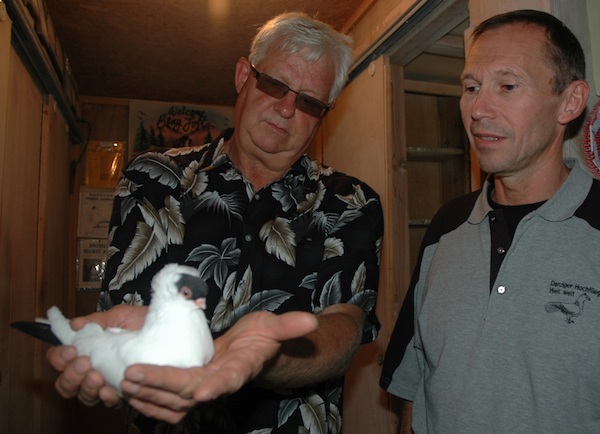ARLINGTON — When Arlington’s Dennis Bray started raising pigeons at the age of 7, he certainly didn’t expect that his hobby would take him across the country and around the world, much less that it would allow him to meet fellow pigeon breeders from other states, and even other nations, who would become his lifelong friends.
When Bray was first mentored by Bob Sutherland in Everett, pigeon feed cost 50 cents for a 10-pound bag and pigeons themselves cost only $2 each, as opposed to the $30 per pigeon that pigeon breeders can spend now. Bray nonetheless stuck with his hobby, attending his first pigeon show in Chehalis, Wash., when he was still in sixth grade, and going on to win five national championships while traveling throughout the United States. He eventually joined six other area pigeon breeders at the international pigeon show in Nuremberg, Germany, in November of 2006.
On Thursday, July 26, Bray was able to return the generosity of a few of his German hosts, by inviting them and their mutual pigeon breeder friends from Utah to an afternoon dinner at his house, one stop of many on the itinerary of the German family of pigeon breeders over the course of late July and early August in the Pacific Northwest.
Norbert Giesecke, his wife Beate, their 20-something sons Patrick and Sascha, and Norbert’s parents Klaus and Christa had already “ridden the duck” in Seattle and gone on the Crystal Mountain gondola by the time Bray received them and the Utah pigeon breeding couple, Brad and Karen Child. While this marks the Gieseckes’ fourth visit to America for pigeon shows, it’s their first in Washington state.
“All the streets are really big in America,” Patrick Giesecke said.
“Everything is closer in Germany,” said Norbert Giesecke, whose relative lack of space in Germany impacts his hobby of pigeon breeding in a number of ways. Even though the international pigeon shows in Germany routinely draw as many as 33,000 pigeons and 50,000 non-winged attendees, the variety that German pigeon breeders are able to raise within each breed are far narrower than in America, since those breeders are often limited to acreage set aside by the German government for them to breed animals such as rabbits, chickens, ducks or pigeons.
Norbert expressed enthusiasm for the variety of colors and classes of pigeons that he’s seen presented by American breeders, and as soon as he saw the pigeon pens in Bray’s backyard, he realized how this depth of field is possible.
“Wow,” Norbert Giesecke exclaimed. “My whole birdhouse would only be a few sections of this,” he told Bray, as they entered the keeping areas for the pigeons, which Bray has separated by age stages. “Most American breeders know more about the genetics of breeding these birds than we Germans do, but the amounts of birds we get at our national shows is more than what we’ve seen here in America.”
Bray was echoed by the Childs in praising not only the dedication of German pigeon breeders, but also the attention that German people as a whole pay to their hobby.
“They just have a passion for it,” Karen Child said. “They run pigeon racing results in their papers where our papers would run boxing scores. No matter which township we’ve visited, the mayors have always met us personally to welcome us.”
“It’s part of our culture to care for small animals,” Norbert Giesecke said.
Brad Child noted that Klaus Giesecke initiated the friendship between the Childs, the Gieseckes, Bray and his fellow Arlington pigeon breeders, Roger and Dottie Hansen, by answering an email from the American pigeon breeders in 2000. Bray believes the Internet will continue to connect pigeon breeders all over the globe.
“These birds have brought us together,” Klaus Giesecke said. “No matter our differences, the birds make it so easy to talk to each other, and we always discuss them as friends.”







